|
TWINBEE 3 : POKO POKO DAIMAŌ
|
|
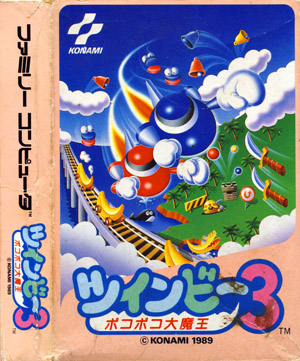
|

|
|
ツインビー3 ポコポコ大魔王
©Konami 1989
Release: 1989-09-29 (¥5500)
Cartridge RC841
Shooter/vertical
|
Twinbee 3 Poko Poko Daimaō is a vertical shooter by Konami.
The game is based on the arcade game Twinbee and is the Famicom
exclusive sequel of Moero TwinBee (also exclusively released for Nintendo's
classic 8-bit system). Donburi island has been at peace for some time and
Dr Cinnamon and his three grandchildren have been enjoying their time together as
a family. But, as we all know, peace and quiet times don't last long. The youngest
grandchildren and his ship Gwinbee have been captured by the evil
Demon King Poko Poko! The oldest children ride their fighters Twinbee
and Winbee once again and fly to the rescue. Like other titles in the series,
the fighters can shoot forward or drop bombs on the ground with their little arms.
Bells hidden inside floating clouds can be shot at and cycle through all kind of power
upgrades and bonuses, such as Speed up (blue), Twin Gun (white),
Laser Beam (red), Flying/Shadow Options (flashing red) or
Shield (flashing white). Some ground enemies also release special items,
such as the powerful smart-bomb that destroys all enemies on screen (question mark),
extra lives (milk bottle) or three-way gun (candy). Some ground items can also work
in combination with bell items, and some even activate bonus levels (see the
Secrets section below for more information). In two player mode, Twinbee
and Winbee can also combine powers and either increase their fire power or
create a super barrier shield. Twinbee 3 consists of five stages (players
can start from any of the first four levels) and also features a
two-simultaneous player option.
|
|
Twinbee 3 Poko Poko Daimaō is technically the third episode in the Twinbee series.
After releasing Twinbee in the arcades in 1985 and porting it to the
Famicom system,
Konami developed two exclusive sequels for Nintendo's 8-bit system, namely
Moero TwinBee: Cinnamon-hakase o Sukue! in 1986
(known as Stinger in America)
and Twinbee 3 Poko Poko Daimaō in 1989. Twinbee 3 was curiously never ported
to other home systems until 2006 when it was finally included in the Japanese-exclusive
Internet Revolution (aka i-Revo) digital library formed by Konami. The
service was sadly terminated in 2011... So this Famicom version is currently
the only version of the game available...
|
|
Curiously, most of the staff that worked on Twinbee 3 was not involved with the
other two Famicom Twinbee games. Two names stand out though.
Noritoshi Kodama was also a graphic designer on Pop'n Twinbee (1990),
Parodius (1990) and Twinbee Taisen Puzzle Drama (1994). Yoshiaki Yamada
(included in the 'thank you' section) was a designer on Detana!!Twinbee (1992)
and was also thanked on Pop'n TwinBee (1990).
|
|
I personally think that Konami's cute and long-running Twinbee
series found its groove with the excellent
Detana!! TwinBee (aka Bells
& Whistles in the west) in 1991. But the two Famicom exclusive episodes
Moero TwinBee and especially Twinbee 3 are notable for a couple of
reasons. I think that they show the evolution of the core concepts that eventually
led to Detana!! TwinBee. With Moero TwinBee, Konami experimented
with side-scrolling levels (in a way similar to Salamander, another of their
trademark series at the time) with questionable results. Twinbee 3 introduced
a better balanced power-bell system but lacked unity with random
and questionable enemy and boss designs. Interestingly, the game also features short and
arguably simple animations at the end of each stage which later became a signature element
of the Twinbee series!
|
G
O
O
D
I
E
S
|
|
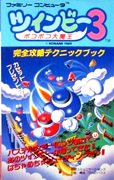
Japanese Guidebook
|
|
|
O
M
A
K
E
|
|
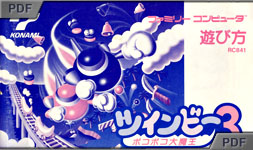
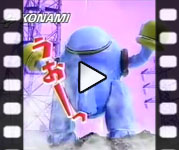
|
|
|
Click on picture to enlarge |
S
E
C
R
E
T
S
|
|
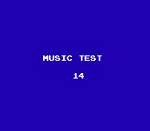 Sound Test Screen:
Sound Test Screen:
At the title screen, press and hold Up and Left on the second controller then select Settings (せってい) to activate the Sound Test screen (picture on the right). There, press Up or Down to select a music track, and press A or B to play it.
Secret Extra Stages:
Ground enemies sometimes release a Dr Cinnamon special item
 .
If collected, it will activate a special bonus extra stage that will start when the current level is completed.
These bonus stages only feature clouds and power-bells for extra points! .
If collected, it will activate a special bonus extra stage that will start when the current level is completed.
These bonus stages only feature clouds and power-bells for extra points!
Matchstick special item:
Ground enemies sometimes release a matchstick. Collect it to light up the next power-bell on fire! Finally, collecting that flaming bell will grant you with temporary invulnerability!
|
|
|
|
LK

|
|
Add your Pov here !
|
P
O
V
s
|
|
Twinbee 3 is probably the best Twinbee game available for the
Famicom system. The gameplay feels truer to the series' roots and only
features vertical-scrolling stages (Moero TwinBee experimented with
side-scrolling levels with questionable results). Konami also
improved the formula in many ways - better and richer graphics, faster and
smoother gameplay, fairer and more balanced power-bell system and impressive
(although wacky) boss battles. However, the three-player option from
Moero TwinBee is not available here and Twinbee 3 only features a
two-simultaneous player mode. As mentioned, this episode feels far better and
richer than other episodes available for the Famicom system, but this
comes at a price and the game also feels shorter (only five levels) and the
difficulty level is on the easy side of the spectrum (although harder modes
are available). Additionally, I'm not a huge fan of some of the themes used
here - some stages are filled with random flying objects (such as music
instruments, top hats or playing cards) that don't really belong to the world
of Twinbee in my opinion. Bosses, although imaginative and technically
impressive, also generally feel out-of-place. I personally think that
Konami's cute and long-running Twinbee series found its groove
with the excellent Detana!! TwinBee in 1991, but Twinbee 3
shouldn't be ignored and is overall a fun shooter that fans shouldn't miss!
|
|
|
|